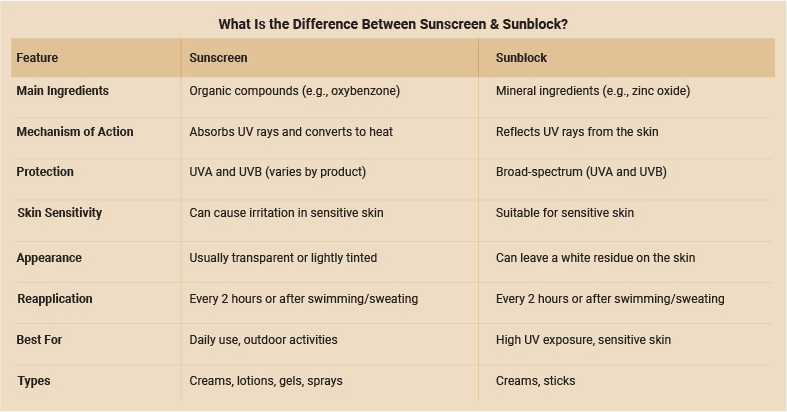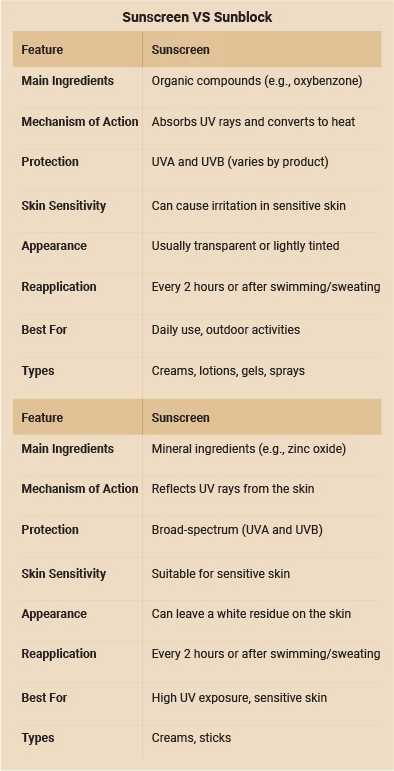
Sunscreen vs Sunblock: Which is Better?
When it comes to protecting your skin from the sun, understanding the difference between sunscreen and sunblock is crucial. With so many products available, it can be confusing to decide which is better suited for your needs. This blog will delve into the differences between sunscreen and sunblock, their benefits, and when you should use each type. By the end, you'll have a clear understanding of sunblock vs sunscreen and which is better for you.
Sunscreen vs Sunblock: What’s the Difference?
What is Sunscreen?
Sunscreen, often referred to as suncream or sunscreen cream, is a topical product that absorbs ultraviolet (UV) radiation from the sun. It contains organic (carbon-based) compounds such as oxybenzone, avobenzone, and octocrylene, which absorb UV rays and release the energy as heat. Sunscreen is designed to protect against both UVA and UVB rays, though the effectiveness can vary depending on the formulation.
What is Sunblock?
Sunblock, or sunblock cream, works by physically blocking UV rays from penetrating the skin. It contains mineral ingredients like zinc oxide or titanium dioxide that sit on the skin’s surface and reflect UV radiation. Sunblock provides broad-spectrum protection against both UVA and UVB rays and is often recommended for those with sensitive skin as it is less likely to cause irritation.


Sunscreen vs Sunblock: Which is Better?
The debate of sunblock vs sunscreen, which is better, largely depends on your specific needs and preferences. Here’s a breakdown to help you decide.
When Should You Use Sunscreen?
Sunscreen is ideal for daily use and outdoor activities where you need a lightweight option that doesn’t leave a visible residue. It’s perfect for casual sun exposure and can be easily integrated into your skincare routine. For those who are looking for the best sunscreen for women, the best sunscreen for men, or even sunscreen for dry skin, there are numerous formulations available to suit different skin types.
What to Look for When Buying Sunscreen?
- Broad-Spectrum Protection: Ensure it protects against both UVA and UVB rays.
- SPF Rating: Choose an SPF of 30 or higher for adequate protection.
- Water Resistance: Important if you’re swimming or sweating.
- Skin Type Compatibility: Look for specific formulations like sunscreen for dry skin or sunscreen for sensitive skin.
When Should You Use Sunblock?
Sunblock is ideal for situations where you’ll be exposed to intense sunlight for extended periods, such as at the beach or during outdoor sports. It’s also highly recommended for those with sensitive skin or for use on areas that need extra protection, like the face. Sunblock is less likely to cause irritation and offers robust protection against both UVA and UVB rays.
What to Look for When Buying Sunblock?
- Zinc Oxide or Titanium Dioxide: These are key ingredients for effective protection.
- Broad-Spectrum Protection: Ensures coverage against both UVA and UVB rays.
- SPF Rating: Opt for SPF 30 or higher.
- Formulation: Choose a cream or stick for ease of application and reapplication.
Do I Need Both Sunscreen and Sunblock?
In the debate of sunscreen vs sunblock for face and body, you might find that having both types on hand is beneficial. For everyday use, a good sunscreen might be sufficient, especially if you prefer a product that blends well with your skin tone and doesn’t leave a residue. On days when you’re expecting prolonged exposure to the sun, such as a beach day or hiking trip, using sunblock can provide the additional protection you need.
Combining both can offer a more comprehensive approach to sun protection. For instance, you might use sunscreen daily and switch to sunblock when participating in outdoor activities. This way, you ensure maximum protection while catering to your skin’s needs and personal preferences.
Why is Sun Protection Important?
Sun protection is crucial for maintaining healthy skin and preventing long-term damage caused by UV radiation.
What Will Happen if I Don't Use Sunscreen or Sunblock?
Failing to use sunscreen or sunblock can lead to a range of skin issues. Short-term exposure can cause sunburn, which is not only painful but can also lead to peeling and blistering. Over time, repeated exposure without protection increases the risk of skin cancer, including melanoma, which can be life-threatening.
Chronic sun exposure also accelerates the skin’s ageing process, leading to premature wrinkles, fine lines, and age spots. The UV rays break down collagen and elastin in the skin, causing it to lose elasticity and firmness. Additionally, unprotected exposure can worsen pigmentation issues, making melasma and sunspots more pronounced.
Takeaway
The choice between sunscreen and sunblock boils down to your specific needs and lifestyle. Sunscreen is excellent for daily use and those who prefer a lightweight, invisible product. Sunblock, on the other hand, offers superior protection and is ideal for prolonged sun exposure and sensitive skin.
Key Points to Remember:
- Sunscreen: Absorbs UV rays, perfect for daily use, available in various forms such as creams, lotions, and sprays.
- Sunblock: Reflects UV rays, best for high UV exposure and sensitive skin, usually found in creams and sticks.
- SPF: Choose SPF 30 or higher for both sunscreen and sunblock.
- Application: Reapply every 2 hours or after swimming/sweating.
Both sunscreen and sunblock are essential in protecting your skin from the harmful effects of UV radiation. Whether you’re looking for the best sunscreen for men, the best sunscreen for women, or a sunblock that provides superior protection, understanding the differences and benefits of each can help you make an informed decision.
To get a comprehensive skincare routine tailored to your specific needs, book an appointment with our aesthetic dermatologists. They can provide expert advice on the best sun protection products and practices to keep your skin healthy and radiant.
Frequently Asked Questions
Yes, you can mix sunscreen and sunblock to maximise your sun protection. Combining them can provide both chemical and physical barriers against UV rays, enhancing overall skin protection.
If your sunscreen or sunblock has hydrating properties, you may skip moisturiser. However, if you have dry skin, it's best to use a separate moisturiser before applying sunscreen or sunblock to ensure adequate hydration.